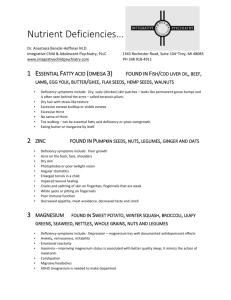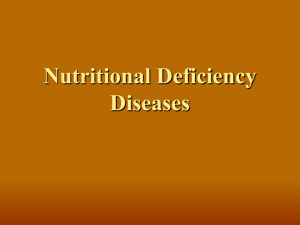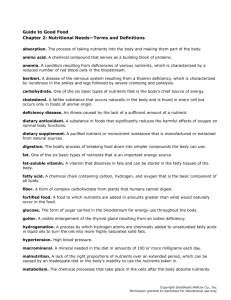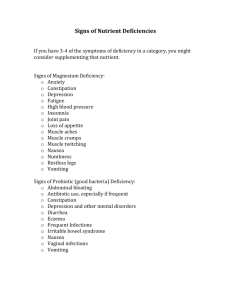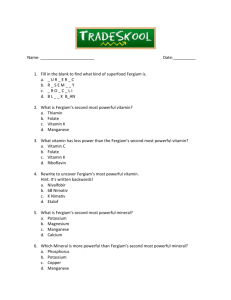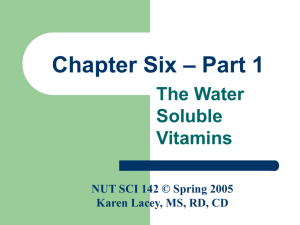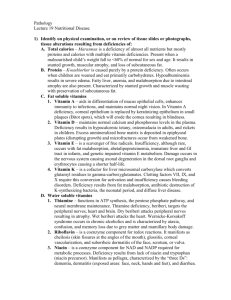SUMMARY OF NUTRIENT INFORMATION Too little protein or too
advertisement
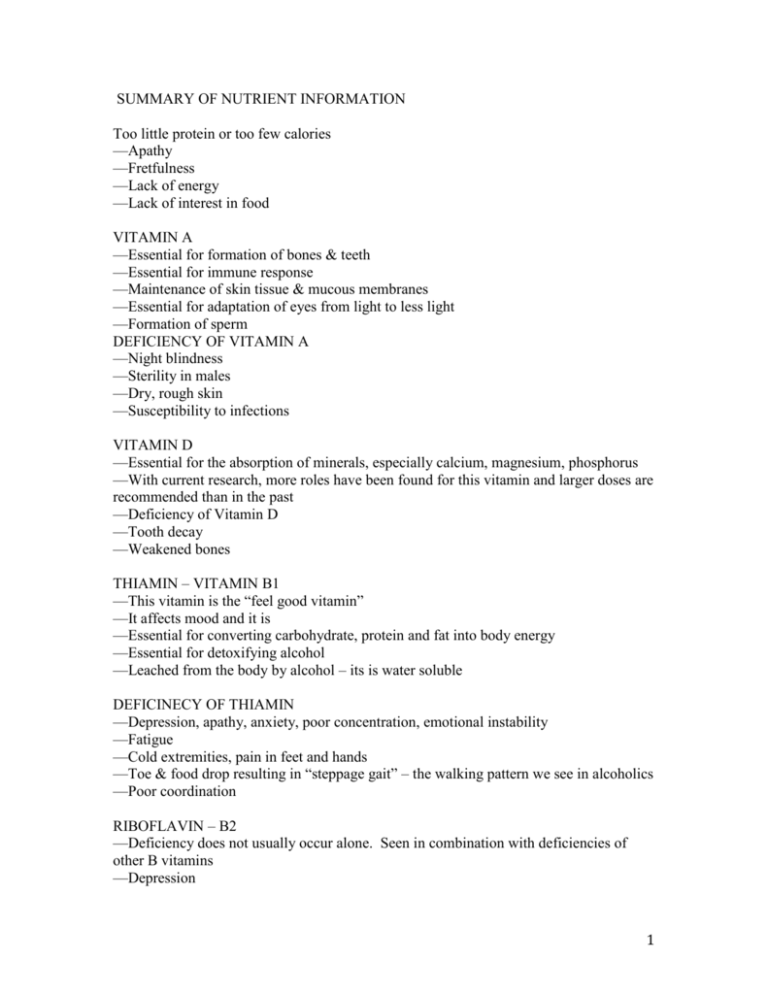
SUMMARY OF NUTRIENT INFORMATION Too little protein or too few calories —Apathy —Fretfulness —Lack of energy —Lack of interest in food VITAMIN A —Essential for formation of bones & teeth —Essential for immune response —Maintenance of skin tissue & mucous membranes —Essential for adaptation of eyes from light to less light —Formation of sperm DEFICIENCY OF VITAMIN A —Night blindness —Sterility in males —Dry, rough skin —Susceptibility to infections VITAMIN D —Essential for the absorption of minerals, especially calcium, magnesium, phosphorus —With current research, more roles have been found for this vitamin and larger doses are recommended than in the past —Deficiency of Vitamin D —Tooth decay —Weakened bones THIAMIN – VITAMIN B1 —This vitamin is the “feel good vitamin” —It affects mood and it is —Essential for converting carbohydrate, protein and fat into body energy —Essential for detoxifying alcohol —Leached from the body by alcohol – its is water soluble DEFICINECY OF THIAMIN —Depression, apathy, anxiety, poor concentration, emotional instability —Fatigue —Cold extremities, pain in feet and hands —Toe & food drop resulting in “steppage gait” – the walking pattern we see in alcoholics —Poor coordination RIBOFLAVIN – B2 —Deficiency does not usually occur alone. Seen in combination with deficiencies of other B vitamins —Depression 1 —Hysteria —Lethargy —Hypochondria —Cracks at the corners of the mouth &/or eyes —Sensitivity to light NIACIN —It is a co-enzyme in energy production —It is also active in the CNS is formation of neurotransmitters DEFICIENCY OF NIACIN —Irritability —Agitation —Depression – severe deficiency – diarrhea, dementia —Headaches —Memory loss, —Emotional instability —Confusion —Lack of appetite —Lack of energy —Apprehension —Insomnia —Irritability —Might have hallucinations VITAMIN B6 —Essential for energy production and for formation of a number of neurotransmitters and formation of red blood cells —Deficiency symptoms: —Irritability —Insomnia —Depression —Fatigue —Headache —Anemia (macrocytic) FOLATE —Essential for formation of red blood cells, strength of body tissue, formation of new tissue (pregnancy) —Depression symptoms —Fatigue —Apathy —Forgetfulness (poor short term memory) —Depression —Disorientation —Confusion 2 VITAMIN C —Essential for formation of body tissue and strength of immune system —Depression —Hysteria —Listlessness —Weakness —Weakened immune system IRON —Essential for formation of red blood cells and oxygen transport —Fatigue —Weakness —Listlessness —Irritability —Lack of color in lips, cheeks, palms, nails indicating anemia MAGNESIUM —Essential for formation of bones, teeth, body tissue, muscle contraction and relaxation, nerve transmission —Apathy —Hyperirritability —Muscle cramps (“charlie horses”) —Tremors —Intentional tremor (trembling when holding something) indicates an imbalance between calcium & magnesium ZINC —Essential for immune response —Zinc is a part of at least 30 body enzymes —Essential for formation of sperm DEFICIENCY —Lack of appetite —Decreased sense of smell resulting in eating more sugar, salt, high fat foods, foods containing chili peppers —Irritability —Mood swings —Lethargy —Decreased interest sex OVERDOSES OF NUTRIENTS— —Thiamin – flat affect —Niacin – potential liver damage at 5000 mg./day —Pyridoxine – disruption of neurotransmitter formation causing poor muscle coordination 3 —Vitamin A – potential for liver damage from high doses —Vitamin C – diarrhea if large amounts of supplements taken Vitamin E – bleeding problems (blood thinner) —Iron – deposits in body tissues. Alcohol causes absorption of excessive amounts —Calcium or magnesium – mineral imbalances —Zinc – G I distress, masks other nutrition problems FOOD AND NUTRITION ASSESSMENT —Questions to ask: —How meals do you eat each day? —Who prepares your food? —How often do you eat in restaurants, at sandwich lines? —What are your other sources of food? —If you live in a home, do you have a place to store food? —What foods do you eat most often? What foods do you avoid? Tell me reasons for avoiding those foods —Is this person alert; are there obvious symptoms of nutritional problems? —How do her/his clothes fit? Is there indication of weight gain or loss —Does the client have bruises? Does the client know what caused the bruises? —Are there wounds that appear not to be healing? Are there cracks or scars at the corners of the mouth —Symptoms that can be observed in clients: —Muscle weakness —Pale nail beds, palms, lips —Bleeding gums — Does the client have tremors? Do the hands tremble causing problems writing or holding onto items? —Does the client have sparse, dry, dull, unruly hair that appears to not be combed? — SPECIFIC NUTRITION QUESTIONS TO ASK —Questions to ask clients: —When you are driving & pass a car with bright lights, do you have problems seeing for a short time? When you go into a movie theater, do your eyes seem to take a long time to adjust to the low light? —Do you always wear dark glasses outdoors? Does bright light seem overwhelming? —How often do you have colds or the flu? —Do you have allergies or food sensitivities? If yes, to what foods? —Do you have constipation? Or diarrhea? —If the client says that milk or ice cream relieves constipation, consider lactose intolerance NUTRITIONAL SUPPLEMENT ISSUES 4 Years of scientific research have documented the amount of nutrients needed by the average person and the balance between these nutrients that affects the body’s ability to utilize them. Nutritional supplements that contain more than three times the recommended intake are more medication than supplement. When choosing supplements pay attention to the percentage of recommended dose. If multiple nutrients are included, the amounts should be approximately the same percentage of the recommendation. If there is a large amount of one or two of those nutrients and the recommended amount of other nutrients, the result might be to create a deficiency of one or more nutrients. 5
